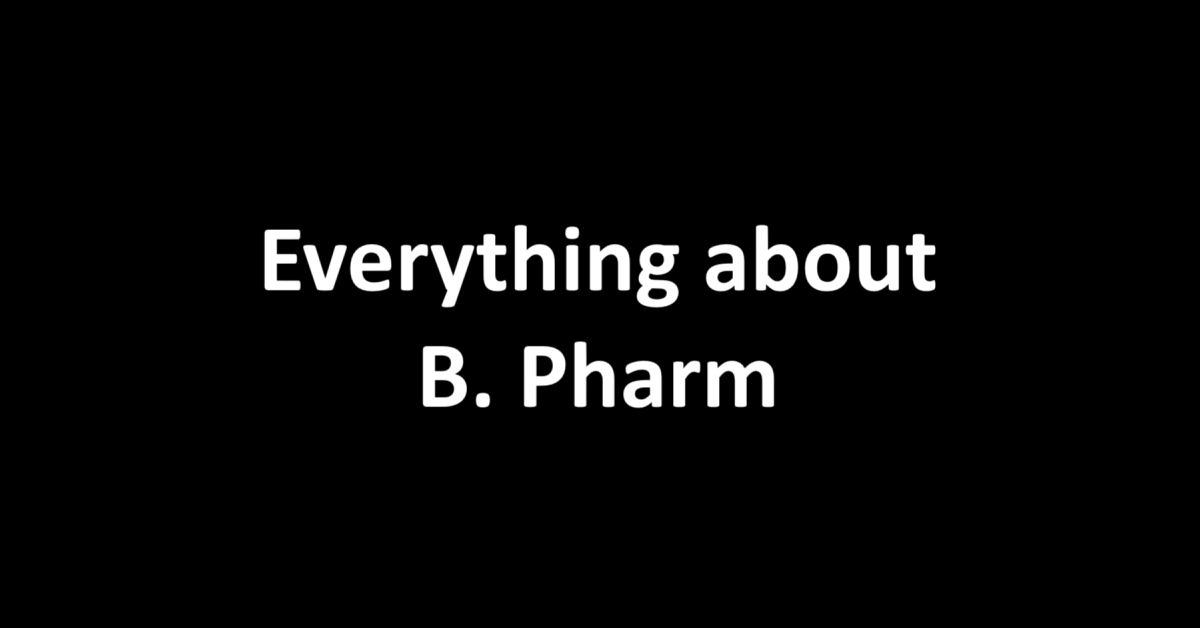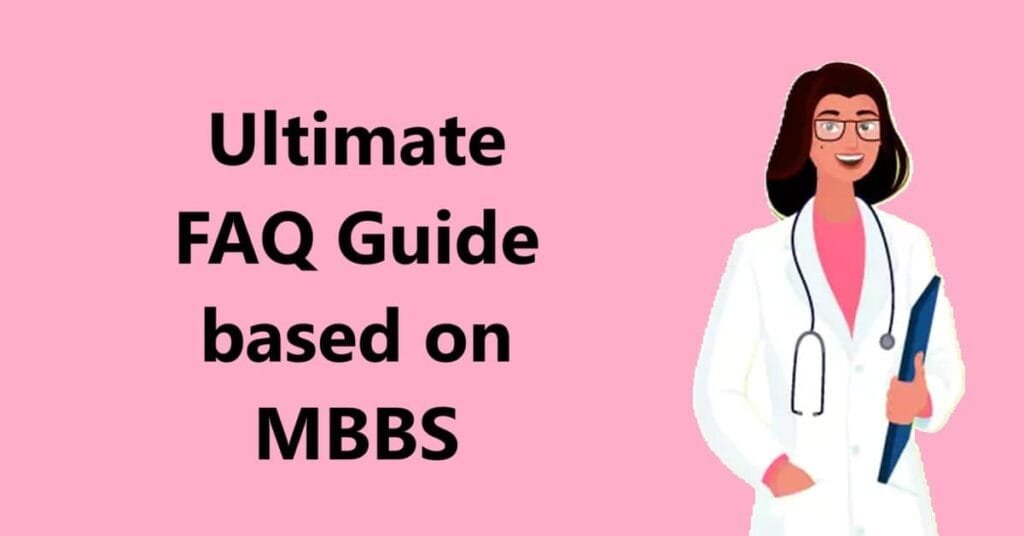B. Pharma, or Bachelor of Pharmacy, is an undergraduate degree program focused on the study of pharmacy and pharmaceutical sciences. It typically spans four years and covers various aspects of pharmaceutical education, including the formulation, dispensing, and appropriate use of medications.
Key Features of B. Pharma:
- Curriculum: The program includes subjects such as organic chemistry, pharmacology, pharmacognosy, pharmaceutical chemistry, medicinal chemistry, and clinical pharmacy. It often combines theoretical knowledge with practical lab work.
- Objective: The primary goal of the B. Pharma program is to train students in drug development, manufacturing, quality control, and the safe use of medications, preparing them for careers in pharmacy and healthcare.
- Eligibility: To enroll in a B. Pharma program, students usually need to have completed their higher secondary education (10+2) with a focus on science subjects, particularly Physics, Chemistry, and Biology or Mathematics.
- Career Opportunities: Graduates of B. Pharma can pursue various career paths, including roles in community pharmacies, hospitals, pharmaceutical companies, regulatory agencies, and academia. They may also have the option to pursue further studies, such as an M. Pharma (Master of Pharmacy) or an MBA in pharmaceutical management.
- Licensing and Regulation: In many countries, including India, graduates must obtain a license to practice pharmacy. This often involves passing a national or state-level examination.
- Importance: The B. Pharma program plays a crucial role in equipping students with the necessary skills to contribute to the healthcare sector, ensuring safe medication practices and promoting public health.
- Internships and Training: Many B. Pharma programs include internships and hands-on training in varied settings, providing students with practical experience and exposure to the pharmacy profession.
This comprehensive foundation prepares graduates for a dynamic career in the healthcare field, where they can make significant contributions to patient care and medication management.
Year-wise Breakdown of B. Pharma Curriculum
First Year
- Human Anatomy and Physiology: Study of the human body systems and their functions.
- Pharmaceutical Chemistry: Introduction to the chemistry of drugs, including structure, properties, and synthesis.
- Biochemistry: Understanding the chemical processes within living organisms.
- Drug Formulation: Basics of how drugs are formulated and the different dosage forms.
- Pharmacognosy: Study of natural products and herbal medicines.
- Mathematics and Statistics: Basic mathematics and statistical methods relevant to pharmacy.
- Communication Skills: Development of effective communication skills in a healthcare context.
Second Year
- Pharmacology: Study of how drugs interact with biological systems and their therapeutic effects.
- Physical Pharmacy: Understanding the physical and chemical principles that govern drug behavior in biological systems.
- Microbiology: Study of microorganisms and their role in health and disease.
- Medicinal Chemistry: Focus on the chemical design and development of pharmaceutical agents.
- Pharmaceutical Analysis: Techniques for analyzing and quantifying drugs and pharmaceutical products.
- Pharmaceutical Biotechnology: Introduction to biotechnology applications in drug development.
Third Year
- Clinical Pharmacy: Principles of patient care and the role of pharmacists in clinical settings.
- Pharmacotherapeutics: Study of the therapeutic use and effects of drugs in various diseases.
- Quality Assurance and Quality Control: Techniques to ensure the quality and safety of pharmaceutical products.
- Drug Regulation and Intellectual Property Rights: Understanding laws and regulations governing pharmaceuticals.
- Community Pharmacy Practice: Focus on the role of pharmacists in community settings.
- Hospital Pharmacy Practice: Overview of pharmacy services in hospital environments.
Fourth Year
- Advanced Pharmacology: In-depth study of drug actions and interactions.
- Pharmaceutical Marketing: Concepts related to marketing and business practices in the pharmaceutical industry.
- Research Methodology: Techniques for conducting research in pharmaceutical sciences.
- Internship/Practical Training: Hands-on experience in various pharmacy settings, such as hospitals, community pharmacies, or pharmaceutical companies.
- Project Work/Dissertation: Research project focused on a specific area of interest in pharmacy.
Additional Components
- Electives: Depending on the institution, students may choose specialized electives related to pharmaceutical sciences, such as toxicology, herbal medicine, or clinical research.
- Seminars and Workshops: Participation in seminars and workshops to gain insights from industry professionals and enhance practical skills.
Career After B. Pharm
A Bachelor of Pharmacy (B. Pharma) opens up a variety of career opportunities in diverse fields within healthcare and pharmaceuticals. Graduates can explore numerous paths based on their interests and further education. Here are some common career opportunities for B. Pharma graduates:
1. Community Pharmacist
- Work in retail pharmacies, providing medications to patients, offering health consultations, and managing prescriptions.
2. Hospital Pharmacist
- Collaborate with healthcare teams in hospitals to ensure safe and effective medication management for patients, often involved in clinical rounds and patient counseling.
3. Pharmaceutical Industry Roles
- Quality Control/Quality Assurance: Ensure the quality and safety of pharmaceutical products.
- Production Manager: Oversee the manufacturing process of drugs.
- Regulatory Affairs: Work with regulatory bodies to ensure compliance with laws and regulations for drug approval and marketing.
- Research and Development (R&D): Participate in the development of new drugs and formulations.
4. Clinical Research Associate
- Monitor and manage clinical trials, ensure compliance with regulatory standards, and evaluate the safety and effectiveness of new drugs.
5. Medical Writer
- Create documentation for pharmaceuticals, including regulatory submissions, research papers, and promotional materials.
6. Pharmaceutical Sales Representative
- Sell and promote pharmaceutical products to healthcare professionals, providing information about drugs and their benefits.
7. Lecturer/Academic Roles
- Teach and conduct research in pharmaceutical sciences at colleges and universities, often requiring further qualifications (e.g., M. Pharma or Ph.D.).
8. Formulation Scientist
- Develop and optimize drug formulations, focusing on creating effective and stable pharmaceutical products.
9. Toxicologist
- Study the effects of chemicals and drugs on living organisms, assessing hazards and risks associated with drug exposure.
10. Pharmaceutical Consultant
- Provide expert advice to healthcare organizations, pharmaceutical companies, and government bodies regarding drug regulation and patient safety.
11. Drug Inspector
- Work with government regulatory agencies to ensure that drugs and pharmaceuticals meet quality and safety standards.
12. Entrepreneurship
- Start your own pharmacy, drug manufacturing company, or healthcare-related business.
13. Health Informatics Specialist
- Use healthcare data management and informatics to improve patient care and optimize pharmaceutical services.
14. Public Health Professional
- Work with government agencies or non-profit organizations to promote public health initiatives and medication safety.
15. Clinical Coordinator
- Manage clinical research projects, interacting with various stakeholders to ensure successful study outcomes.
Continuing Education and Specialization
Many B. Pharma graduates choose to pursue further education, such as a Master’s degree (M. Pharma) or an MBA in pharmaceutical management, to enhance their career prospects and specialize in specific areas of interest.
These diverse career paths highlight the versatility of a B. Pharma degree, enabling graduates to make significant contributions to healthcare, research, and the pharmaceutical industry.
Admission Process for B. Pharm
Getting admission to a B. Pharma (Bachelor of Pharmacy) program in India involves several steps. The process can vary slightly based on the college or university, but here are the general guidelines to follow:
1. Eligibility Criteria
- Educational Qualification: Candidates must have completed the Higher Secondary Certificate (HSC) or equivalent (10+2) with subjects such as Physics, Chemistry, and Biology/Mathematics. Some institutions may also accept students with a background in Vocational Pharmacy.
- Minimum Marks: Many institutions require a minimum percentage (often around 50% to 60%) in the qualifying exam.
2. Entrance Exams
- While some colleges offer direct admission based on 12th-grade marks, many require candidates to take entrance exams. Common entrance exams for B. Pharma in India include:
- Entrance Exams by State Governments: These vary by state, often including exams specific to that state’s educational institutions.
- All India Level Entrance Exams: Such as the Joint Entrance Examination (JEE) or the National Eligibility cum Entrance Test (NEET), depending on the university’s admission criteria.
- Institution-Specific Entrance Exams: Some universities conduct their own entrance exams. Check with the specific institutions for details.
3. Application Process
- Research Colleges: Identify colleges or universities offering B. Pharma programs. Look for accreditation, faculty, campus facilities, and placement records.
- Fill Application Forms: Obtain and fill out the application forms for the desired colleges. This is often done online through the college’s official website.
- Upload Documents: Prepare the necessary documents such as:
- Mark sheets of 10th and 12th grades
- Birth certificate
- Passport-sized photographs
- Caste/category certificate (if applicable)
- Entrance exam score card (if applicable)
- Application Fee: Pay any application fees as required by the institution.
4. Entrance Exam Preparation
- Prepare for any required entrance examinations by studying relevant subjects (Physics, Chemistry, and Biology/Mathematics) and following an appropriate prep plan.
5. Counseling and Admission Process
- After the entrance exam results are declared, eligible candidates may need to participate in a counseling process.
- Seat Allotment: Based on exam scores and preferences, seats will be allocated. Candidates may have to visit designated centers for document verification and choosing their preferred institution.
- Payment of Fees: Once you receive a seat allocation, pay the admission fees to secure your place in the program.
6. Course Enrollment
- Complete any additional admissions formalities as specified by the institution, such as medical examinations or orientation sessions.
7. Start the Program
- Attend classes and engage in practical training and other program components as you progress through your B. Pharma education.
Here’s a list of some of the top colleges in India offering B. Pharma (Bachelor of Pharmacy) programs. This list includes a mix of government and private institutions, along with a brief description of each.
Top 50 B. Pharma Colleges in India
- Jamia Hamdard, New Delhi
- Offers a well-rounded B. Pharma program with a focus on research and modern pharmacy practices.
- Delhi Institute of Pharmaceutical Sciences and Research (DIPSAR), New Delhi
- Known for its excellent faculty and state-of-the-art infrastructure, DIPSAR offers various pharmacy courses.
- Punjab University, Chandigarh
- A prestigious university offering a comprehensive B. Pharma program with practical exposure and research opportunities.
- Indian Institute of Technology (IIT), BHU Varanasi
- Offers a unique B. Pharma program emphasizing pharmaceutical technology within its engineering curriculum.
- Manipal College of Pharmaceutical Sciences, Manipal
- Well-known for its quality education and research facilities, this college offers a progressive curriculum in pharmacy.
- National Institute of Pharmaceutical Education and Research (NIPER), Mohali
- Offers an integrated approach to pharmaceutical education, with an emphasis on research and development.
- KLE University’s College of Pharmacy, Belagavi
- Known for its academic excellence and state-of-the-art teaching facilities.
- Birla Institute of Technology and Science (BITS), Pilani
- Offers a strong B. Pharma program with a focus on practical and industrial training.
- JSS College of Pharmacy, Mysuru
- Recognized for its quality education and research initiatives in the field of pharmacy.
- Institute of Chemical Technology (ICT), Mumbai
- Focused on chemical and pharmaceutical sciences, ICT offers a comprehensive B. Pharma program.
- L. M. College of Pharmacy, Ahmedabad
- One of the oldest pharmacy colleges in India, offering a blend of classical and contemporary pharmacy education.
- Dr. D. Y. Patil Institute of Pharmaceutical Sciences and Research, Pune
- Known for its innovative teaching methodologies and extensive research programs.
- Suresh Gyan Vihar University, Jaipur
- Offers a modern approach to pharmacy education, focusing on industry relations and practical training.
- College of Pharmaceutical Sciences, Berhampur
- Focuses on imparting quality education in pharmaceutical sciences and drug development.
- Nirma University, Ahmedabad
- Known for its strong emphasis on academic rigor and state-of-the-art facilities.
- M. S. Ramaiah College of Pharmacy, Bangalore
- Offers diverse programs in pharmacy with a strong emphasis on practical training and employability.
- Gujarat Technological University, Ahmedabad
- A leading university with multiple pharmacy colleges under its umbrella, known for innovative programs.
- Chandigarh College of Pharmacy, Mohali
- Provides a robust B. Pharma program with a focus on research and innovation.
- Bharati Vidyapeeth College of Pharmacy, Pune
- Offers comprehensive pharmacy education with modern facilities and experienced faculty.
- Sam Higginbottom University of Agriculture, Technology & Sciences, Allahabad
- Offers a holistic approach to pharmaceutical education with a focus on agriculture and technology.
- Lovely Professional University, Punjab
- Known for a wide range of programs and a focus on industry-aligned education in pharmacy.
- Rajasthan University of Health Sciences, Jaipur
- Offers a well-rounded approach to pharmaceutical education and research opportunities.
- Babu Banarasi Das University, Lucknow
- Provides a robust B. Pharma program with modern facilities and experienced faculty.
- Shivaji University, Kolhapur
- Offers quality education in pharmacy with an emphasis on research and practical exposure.
- C. L. Baid Metha College of Pharmacy, Chennai
- Focused on imparting quality pharmacy education with modern teaching methods and research opportunities.
- Sanketika Institute of Pharmaceutical Sciences, Visakhapatnam
- Provides an industry-focused curriculum along with extensive practical training.
- I. S. F. College of Pharmacy, Moga
- Offers quality education and infrastructure to support budding pharmacy professionals.
- Bharati Vidyapeeth Roshan Vikas Institute of Pharmacy, Pune
- Focus on research, innovation, and quality pharmacy education.
- Narmada College of Pharmacy, Gujarat
- Known for its academic excellence and modern teaching methodologies.
- Mahatma Gandhi Medical College and Research Institute, Puducherry
- Combines pharmacy education with medical sciences for a comprehensive approach.
- B. R. Ambedkar University, Delhi
- Offers pharmacy courses with a focus on social health and community pharmacy.
- Vivekananda Institute of Professional Studies, Delhi
- Provides quality education in pharmacy with innovative teaching techniques.
- Vishwa Vishwani Institute of Systems and Management, Hyderabad
- Focuses on modern practices in pharmacy education with extensive industry interaction.
- PSG College of Pharmacy, Coimbatore
- Known for its strong curriculum and research opportunities in pharmaceutical sciences.
- Government College of Pharmacy, Amravati
- Provides a solid foundation in pharmacy with experienced faculty and good infrastructure.
- M. J. College of Pharmacy, Jalna
- Offers comprehensive education and training in pharmacy with modern facilities.
- Vikas College of Pharmacy, Guntur
- Focuses on quality education in pharmaceutical sciences with active research programs.
- M.S. Ramaiah Medical College, Bangalore
- Offers a unique integration of pharmacy with medical sciences.
- Mahatma Jyotiba Phule Rohilkhand University, Bareilly
- Known for developing a strong academic environment for pharmacy education.
- Medwin Institute of Pharmacy, Hyderabad
- Focuses on practical education and training for students.
- Siddhivinayak Technical Campus, Pune
- Provides a comprehensive B. Pharma program with modern amenities.
- B. K. Birla Institute of Applied Sciences, Uttarakhand
- Offers a strong academic program in pharmacy with practical exposure.
- Annamalai University, Chidambaram
- Provides a wide-range B. Pharma program with an emphasis on research.
- B. S. Abdur Rahman Crescent Institute of Science and Technology, Chennai
- Offers a well-rounded program with modern infrastructure.
- Indira Gandhi Institute of Aeronautics, Raipur
- Focuses on integrating technology with pharmaceutical education.
- Shree H. N. Patel Institute of Pharmaceutical Education and Research, Gujarat
- Known for its quality education and strong industry connections.
- Smt. Chandaben Homeopathic Medical College, Mumbai
- Offers integrated courses in pharmacy and homeopathic practices.
- Shri Ram Murti Smarak College of Engineering and Technology, Bareilly
- Provides comprehensive education in pharmacy and technology.
- Raghavendra Institute of Pharmaceutical Education and Research, Karnataka
- Focus on modern pharmacy practices and research.
- Sri Aurobindo Institute of Pharmacy, Indore
- Offers a strong curriculum and practical training for students in pharmacy.


